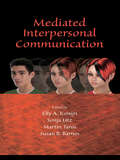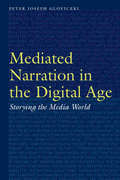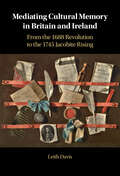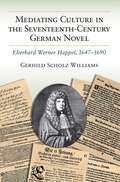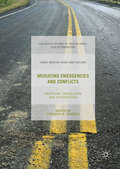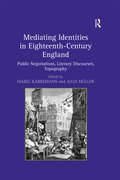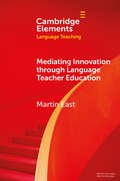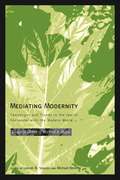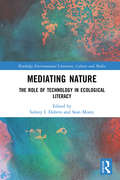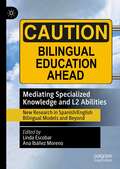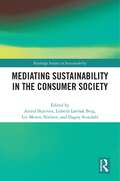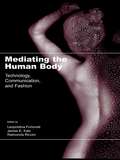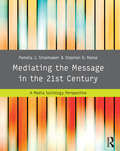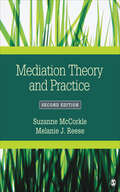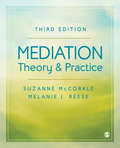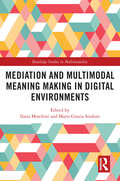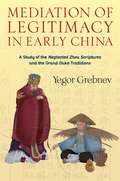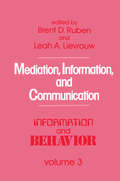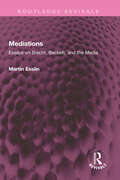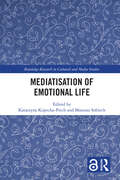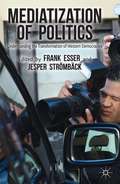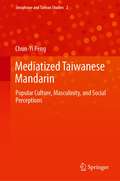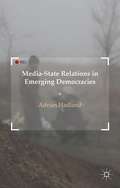- Table View
- List View
Mediated Interpersonal Communication
by Elly A. Konijn Sonja Utz Martin Tanis Susan B. BarnesMediated interpersonal communication is one of the most dynamic areas in communication studies, reflecting how individuals utilize technology more and more often in their personal interactions. Organizations also rely increasingly on mediated interaction for their communications. Responding to this evolution in communication, this collection explores how existing and new personal communication technologies facilitate and change interpersonal interactions. Chapters offer in-depth examinations of mediated interpersonal communication in various contexts and applications. Contributions come from well-known scholars based around the world, reflecting the strong international interest and work in the area.
Mediated Narration in the Digital Age: Storying the Media World (Frontiers of Narrative)
by Peter Joseph GloviczkiMediated Narration in the Digital Age examines mediated narration from 1991 through 2018. Peter Joseph Gloviczki considers this pivotal period spanning the rise of the World Wide Web through the growth of social media to understand how contemporary media accounts storied everyday life and times of crisis. He uses examples across media culture to show that complicated issues benefit from a critical poststructuralist approach to journalism, which promotes a communitarian ethos of respect, inclusion, and dialogue. Textual analysis of a wide range of media narratives—from a 2012 YouTube clip outlining a time line of the Sandy Hook school shootings, to coverage of then-newly-discovered footage of President Roosevelt in a wheelchair in 2013, to the Cincinnati Enquirer&’s 2017 piece &“Seven Days of Heroin&”—illustrate how theoretical concepts work in practice while explaining the new media environment. In response to the lack of awareness of news as mediated narration, Gloviczki calls for journalists to be aware of their role in meaning-making and the attendant ethical responsibilities. He provides the analysis essential to effective practice that emphasizes the connection between the individual and the community in order to more fully represent the mediated body.
Mediating Cultural Memory in Britain and Ireland: From the 1688 Revolution to the 1745 Jacobite Rising
by Leith DavisMediating Cultural Memory is the first book to analyze the relationship between cultural memory, national identity and the changing media ecology in early eighteenth-century Britain. Leith Davis focuses on five pivotal episodes in the histories of England, Scotland and Ireland: the 1688 'Glorious' Revolution; the War of the Two Kings in Ireland (1688-91); the Scottish colonial enterprise in Darien (1695-1700); the 1715 Jacobite Rising; and the 1745 Jacobite Rising. She explores the initial inscription of these episodes in forms such as ballads, official documents, manuscript newsletters, correspondence, newspapers and popular histories, and examines how counter-memories of these events continued to circulate in later mediations. Bringing together Memory Studies, Book History and British Studies, Mediating Cultural Memory offers a new interpretation of the early eighteenth century as a crucial stage in the development of cultural memory and illuminates the processes of remembrance and forgetting that have shaped the nation of Britain.
Mediating Culture In The Seventeenth-century German Novel: Eberhard Werner Happel, 1647-1690
by Gerhild Scholz WilliamsEberhard Happel, German Baroque author of an extensive body of work of fiction and nonfiction, has for many years been categorized as a “courtly-gallant” novelist. In Mediating Culture in the Seventeenth-Century German Novel, author Gerhild Scholz Williams argues that categorizing him thus is to seriously misread him and to miss out on a fascinating perspective on this dynamic period in German history. Happel primarily lived and worked in the vigorous port city of Hamburg, which was a “media center” in terms of the access it offered to a wide library of books in public and private collections. Hamburg’s port status meant it buzzed with news and information, and Happel drew on this flow of data in his novels. His books deal with many topics of current interest—national identity formation, gender and sexualities, Western European encounters with neighbors to the East, confrontations with non-European and non-Western powers and cultures—and they feature multiple media, including news reports, news collections, and travel writings. As a result, Happel’s use of contemporary source material in his novels feeds our current interest in the impact of the production of knowledge on seventeenth-century narrative Mediating Culture in the Seventeenth-Century German Novel explores the narrative wealth and multiversity of Happel’s work, examines Happel’s novels as illustrative of seventeenth-century novel writing in Germany, and investigates the synergistic relationship in Happel’s writings between the booming print media industry and the evolution of the German novel.
Mediating Emergencies and Conflicts
by Federico M. FedericiContributors to this volume discuss different types of emergencies and conflicts and how challenging these multilingual operational environments are for linguists. The growth in reach and number of international relief operations has exposed the limits of current research into these challenges. Evidence in disaster management studies suggests communication remains a major operational issue. This book calls for enhanced focus on the role of translators and interpreters in emergencies by discussing existing research and questions which have emerged from experience in the field. Contributions in this volume undeniably demonstrate the need for multidisciplinary studies in mediating multilingual emergencies. They consider emergencies in hospitals (Cox and Lázaro Gutiérrez), in disaster response (Dogan), in bespoke training to translators in fast-developing crises (O'Brien), and in planning responses in predictably dangerous habitats (Razumovskaya & Bartashova). The volume also illustrates scenarios in which discourse on language mediation shows bias by limiting political dialogues (Al Shehari), by conditioning news reporting (Skorokhod), and by enforcing stereotypical notions of linguists in wars (Gaunt).
Mediating Identities in Eighteenth-Century England: Public Negotiations, Literary Discourses, Topography
by Isabel Karremann Anja MüllerThrough case studies from diverse fields of cultural studies, this collection examines how different constructions of identity were mediated in England during the long eighteenth century. While the concept of identity has received much critical attention, the question of how identities were mediated usually remains implicit. This volume engages in a critical discussion of the connection between historically specific categories of identity determined by class, gender, nationality, religion, political factions and age, and the media available at the time, including novels, newspapers, trial reports, images and the theatre. Representative case studies are the arrival of children's literature as a genre, the creation of masculine citizenship in Defoe's novels, the performance of gendered and national identities by the actress Kitty Clive or in plays by Henry Fielding and Richard Sheridan, fashion and the public sphere, the emergence of the Whig and Tory parties, the radical culture of the 1790s, and visual representations of domestic and imperial landscape. Recognizing the proliferation of identities in the epoch, these essays explore the ways in which different media determined constructions of identity and were in turn shaped by them.
Mediating Innovation through Language Teacher Education (Elements in Language Teaching)
by Martin EastThis Element examines how pedagogical innovation in language classrooms can be mediated through language teacher education (LTE) by subjecting the author's own practices as a teacher educator to scrutiny. Starting from the premise that implementing innovation can be a challenging enterprise, effective LTE is framed as being built on helping practitioners to recognise and confront often deeply-rooted beliefs and adjust subsequent practices through critical reflection on what an innovation may look like both theoretically and practically. A critically reflective lens is then applied to the author's own work as a teacher educator over several years through a research approach known as self-study of teacher education practices or S-STEP. The approach highlights changes to the author's beliefs and practices as lessons emerged from beginning teachers' engagement with innovative ideas. These are presented with the aim of better understanding how teachers' beliefs and practices with regard to innovation can be enhanced effectively.
Mediating Modernity: Challenges and Trends in the Jewish Encounter with the Modern World
by Michael Brenner Lauren B. StraussIn Mediating Modernity, contemporary Jewish scholars pay tribute to Michael A. Meyer, scholar of German-Jewish history and the history of Reform Judaism, with a collection of essays that highlight growing diversity within the discipline of Jewish studies. The occasion of Meyer's seventieth birthday has served as motivation for his colleagues Lauren B. Strauss and Michael Brenner to compile this volume, with essays by twenty-four leading academics, representing institutions in five countries. Mediating Modernity is introduced by an overview of modern Jewish historiography, largely drawing on Meyer's work in that field, delineating important connections between the writing of history and the environment in which it is written. Meyer's own areas of specialization are reflected in essays on Moses Mendelssohn, German-Jewish historiography, the religious and social practices of German Jews, Reform Judaism, and various Jewish communities in America. The volume's field of inquiry is broadened by essays that deal with gender issues, literary analysis, and the historical relationship of Israel and the Palestinians. Though other volumes have been compiled to honor Jewish historians, Mediating Modernity is unique in the personal and intellectual relationships shared by its contributors and Michael A. Meyer. Scholars of Jewish studies, German history, and religious history will appreciate this timely volume.
Mediating Nature: The Role of Technology in Ecological Literacy (Routledge Environmental Literature, Culture and Media)
by Sean Morey Sidney I. DobrinMediating Nature considers how technology acts as a mediating device in the construction and circulation of images that inform how we see and know nature. Scholarship in environmental communication has focused almost exclusively on verbal rather than visual rhetoric, and this book engages ecocritical and ecocompositional inquiry to shift focus onto the making of images. Contributors to this dynamic collection focus their efforts on the intersections of digital media and environmental/ecological thinking. Part of the book’s larger argument is that analysis of mediations of nature must develop more critical tools of analysis toward the very mediating technologies that produce such media. That is, to truly understand mediations of nature, one needs to understand the creation and production of those mediations, right down to the algorithms, circuit boards, and power sources that drive mediating technologies. Ultimately, Mediating Nature contends that ecological literacy and environmental politics are inseparable from digital literacies and visual rhetorics. The book will be of interest to scholars and students working in the fields of Ecocriticism, Ecocomposition, Media Ecology, Visual Rehtoric, and Digital Literacy Studies.
Mediating Specialized Knowledge and L2 Abilities: New Research in Spanish/English Bilingual Models and Beyond
by Linda Escobar Ana Ibáñez MorenoThis edited book presents a selection of new empirical studies in English for Specific Purposes (ESP) and English for Academic Purposes (EAP), showcasing the best practices of educators in their particular contexts. The chapters cover settings grouped into three main categories: L2 abilities and English as a medium of instruction in English/Spanish bilingual contexts; ESP in international contexts; and EAP and academic writing. The authors examine topics and contexts that have been under-explored in the literature to date, contributing to wider discussions of English-language mediation in educational settings and also touching on areas such as international mobility, migration, and social integration in multicultural environments. This book will be of interest to academics and practitioners in an interdisciplinary range of fields, including applied linguistics, language education policy, multilingualism, migration policy, and positive psychology and motivation.
Mediating Sustainability in the Consumer Society (Routledge Studies in Sustainability)
by Dagny Stuedahl Astrid Skjerven Lisbeth Løvbak Berg Liv Merete NielsenThis book sheds light on the role and impact of sustainability mediation, an effective tool for political authorities and business enterprises to persuade consumers of the integrity of their actions, products, and services.In this era of ecological and societal crises fuelled by increasing consumption, sustainability has become a key buzzword and target to attain. Governments around the world argue that they will meet their sustainability goals through environmental actions, by enabling consumers to make better choices and expecting brands to respond accordingly. At the same time, consumers are overwhelmed by the messaging conveyed in sustainability marketing campaigns, often featuring misleading greenwashing, with political authorities, organisations, and business enterprises all having conflicting interests. In this complex scenario, mediation has become a crucial issue. This book offers a critical and multidisciplinary view of sustainability mediation from experts in the fields of philosophy, consumption research, media studies, fashion, design, and citizenship, offering a unique, holistic view. Each chapter highlights different and problematic aspects of the cultural narratives being communicated, for example, the necessity of growth and the notion of a green economy. They present current theories, methods, indicators, and strategies used to assess and measure the relation between mediation, behaviour, and sustainable development.This book is of interest to scholars, researchers, and postgraduate students in all subject fields concerned with sustainability, including design, visual communication, fashion, consumption, media and journalism, and sustainable development.
Mediating the Human Body: Technology, Communication, and Fashion
by James E. Katz Leopoldina Fortunati Raimonda RicciniThe ever-increasing integration of technology and the human body is attracting attention from religious, business, and political leaders around the world, and the topic promises to be a significant social issue in the 21st century. In Mediating the Human Body: Technology, Communication, and Fashion, editors Leopoldina Fortunati, James E. Katz, and Raimonda Riccini bring together a thoughtful group of leading international scholars and analysts to explore the effects of new technologies on human beings. They focus specifically on the intersection of new communication technologies and the body, and offer novel insights based on recent theoretical progress and current research on new interpersonal technology. Through literary analysis, historical comparisons, analytical reports, and speculative interpretations, the contributors to this volume seek to understand the experience of the body as it is mediated among competing forces and intellectual domains. Arising from The Human Body Between Technologies, Communication and Fashion symposium held in Milan, Italy, contributions cover a wide array of topics and offer varied perspectives on how communication technologies are assimilated into people's lives, bodies, and homes, and thus become part of individuals' self-images and social relationships. From this multidisciplinary, multi-national base, the volume illuminates the sense and dimension of this interpenetration between body and technology. In its broad scope, the topics range from the wellsprings of consciousness to the use of technology as a fashion statement. Bringing together scholarship from a variety of disciplines, including communication, medicine, technology, and human-computer interaction, this distinctive anthology will provide new insights to scholars and advanced students exploring body-technology intersections and the attendant implications. Mediating the Human Body offers a unique contribution to future discussions, and will be relevant to continuing study and research in communication and technology, human-computer interaction, gender studies, social psychology, and design.
Mediating the Message in the 21st Century: A Media Sociology Perspective
by Stephen D. Reese Pamela J. ShoemakerHailed as one of the "most significant books of the twentieth century" by Journalism and Mass Communication Quarterly, Mediating the Message has long been an essential text for media effects scholars and students of media sociology. This new edition of the classic media sociology textbook now offers students a comprehensive, theoretical approach to media content in the twenty-first century, with an added focus on entertainment media and the Internet.
Mediation Theory and Practice
by Suzanne Mccorkle Melanie J. ReeseBlending theory and research with practical application, Mediation Theory and Practice, Second Edition, by Suzanne McCorkle and Melanie J. Reese, provides a thorough introduction to today’s ever expanding world of mediation, including updated research and new cases for analysis. Innovative yet practical, research-based yet readable, the book provides an overview of the basic principles of mediation in a variety of contexts to help readers understand mediation and its role in today’s society. Throughout the book, the authors help readers develop foundational mediation skills, including issue identification, setting the agenda for negotiation, problem solving, settlement, and closure. Case studies and examples in every chapter, plus an appendix of role-playing scenarios, make this book ideal book for both college courses and certification training programs.
Mediation Theory and Practice
by Melanie J. Reese Suzanne McCorkleBlending theory and research with practical application, Mediation Theory and Practice, Second Edition, by Suzanne McCorkle and Melanie J. Reese, provides a thorough introduction to today’s ever expanding world of mediation, including updated research and new cases for analysis. Innovative yet practical, research-based yet readable, the book provides an overview of the basic principles of mediation in a variety of contexts to help readers understand mediation and its role in today’s society. Throughout the book, the authors help readers develop foundational mediation skills, including issue identification, setting the agenda for negotiation, problem solving, settlement, and closure. Case studies and examples in every chapter, plus an appendix of role-playing scenarios, make this book ideal book for both college courses and certification training programs.
Mediation Theory and Practice
by Melanie J. Reese Suzanne McCorkleMediation Theory and Practice, Third Edition introduces students to the process of mediation by using practical examples that show students how to better manage conflicts and resolve disputes. Authors Suzanne McCorkle and Melanie J. Reese help students to understand the research and theory that underlie mediation, as well as provide students with the foundational skills a mediator must possess in any context, including issue identification, setting the agenda for negotiation, problem solving, settlement, and closure. New to the Third Edition: Expanded content on the role of evaluative mediation reflects the latest changes to the alternative dispute resolution field, helping students to distinguish between various approaches to mediation. Additional discussions around careers in conflict management familiarize students with employment opportunities for mediators, standards of professional conduct, and professional mediator competencies. New activities and case studies throughout each chapter assist students in developing their mediation competency.
Mediation Theory and Practice
by Melanie J. Reese Suzanne McCorkleMediation Theory and Practice, Third Edition introduces students to the process of mediation by using practical examples that show students how to better manage conflicts and resolve disputes. Authors Suzanne McCorkle and Melanie J. Reese help students to understand the research and theory that underlie mediation, as well as provide students with the foundational skills a mediator must possess in any context, including issue identification, setting the agenda for negotiation, problem solving, settlement, and closure. New to the Third Edition: Expanded content on the role of evaluative mediation reflects the latest changes to the alternative dispute resolution field, helping students to distinguish between various approaches to mediation. Additional discussions around careers in conflict management familiarize students with employment opportunities for mediators, standards of professional conduct, and professional mediator competencies. New activities and case studies throughout each chapter assist students in developing their mediation competency.
Mediation and Multimodal Meaning Making in Digital Environments (Routledge Studies in Multimodality)
by Ilaria Moschini and Maria Grazia SindoniThis collection explores the mediation of a wide range of processes, texts, and practices in contemporary digital environments through the lens of a multimodal theory of communication. Bringing together contributions from renowned scholars in the field, the book builds on the notion that any form of digital communication inherently presents a rich combination of different semiotic modes and resources as a jumping-off point from which to critically reflect on digital mediation from three different perspectives. The first section looks at social and semiotic practices and the implications of their mediation on artistic production, cultural heritage, and commerce. The second part of the volume focuses on dynamics of awareness, cognition, and identity formation in participants to digitally-mediated communicative processes. The book’s final section considers the impact of mediation on shaping new and different types of textualities and genres in digital spaces. The book will be of particular interest to scholars, researchers and students in multimodality, digital communication, social semiotics, and media studies.
Mediation of Legitimacy in Early China: A Study of the Neglected Zhou Scriptures and the Grand Duke Traditions (Tang Center Series in Early China)
by Yegor GrebnevScholarship on early China has traditionally focused on a core group of canonical texts. However, understudied sources have the potential to shift perspectives on fundamental aspects of Chinese intellectual, religious, and political history. Yegor Grebnev examines crucial noncanonical texts preserved in the Yi Zhou shu (Neglected Zhou Scriptures) and the Grand Duke traditions, which represent scriptural traditions influential during the Warring States period but sidelined in later history. He develops an innovative framework for the study and interpretation of these texts, focusing on their role in the mediation of royal legitimacy and their formative impact on early Daoism.Grebnev demonstrates the centrality of the Yi Zhou shu in Chinese intellectual history by highlighting its simultaneous connections to canonical traditions and esoteric Daoism. He also shows that the Daoist rituals of textual transmission embedded in the Grand Duke traditions bear an imprint of the courtly environment of the Warring States period, where early Daoists strove for prestige and power, offering legitimacy through texts ascribed to the mythical sage rulers. These rituals appear to have emerged at the same period as the core Daoist philosophical texts and not several centuries later as conventionally believed, which calls for a reassessment of the history of Daoism’s interrelated religious and philosophical strands. Offering a far-reaching reconsideration of early Chinese intellectual and religious history, Mediation of Legitimacy in Early China sheds new light on the foundations of the Chinese textual tradition.
Mediation, Information, and Communication (Information And Behavior Ser. #Vol. 3)
by Brent D. Ruben and Leah A. LievrouwThis third volume of Information and Behavior shows broad continuities with previous volumes in this series, but it also represents an important evolution. In emphasizing theoretical advances in mediation, information, and communication processes, this volume has unifying themes at the cutting edge of communication research, linking communication with areas as far-ranging as cognitive psychology, intellectual history, social psychology, policy, and macroeconomics.A sampling of the contents indicates both continuities and discontinuities of communication research embodied in this volume. Contributions include Joseph Turow, "Mass Communication as Concept"; Gary Grumpert and Robert Cathcart, "A Theory of Mediation;" Leah Lievrouw and T. Andrew Finn, "Common Dimensions of Communication"; Joshua Meyrowitz, "Mediated and Unmediated Behavior"; Kathleen Reardon, "Teaching Children About AIDS"; Sari Thomas, "The Death of Intellectual History and the Birth of the Transient Past"; Sheizaf Rafaeli, "Interacting with Media."The second part of the work, emphasizing research and policy in specific information societies and regions, includes an opening essay by Everett M. Rogers, and follow-up studies by Judith K. Larsen on "Silicon Valley"; Quentin W. Lindsey on "The North Carolina Research Triangle"; Luis Fonseca, "High Technology in Brazil"; Ruyzo Ogasawara, "High Technology in Japan"; and Mitchell Moss, "Telecommunications and Financial Centers."The final two portions of the book cover social theory and cultural processes. They include articles by Jerry Salvaggio and Richard Nelson, "Models for Developing Telecommunications and Information Industries"; Everett M. Rogers and James Dearing, "University-Industry Technology Transfer"; Frederick Williams, "The Communications Revolution Revisited"; Rolf Wigand, "Recurring Questions about the Information Society"; Lee Thayer, "Tropes and Things"; Gordon L. Miller, "The Energy of Intelligence"; David Carr, "Thinking in Museums;" Benjamin J. Bates, "Information as an Economic Good"; Jorge Schement and Daniel Stout, "A Time-Line of Information Technology."
Mediations: Essays on Brecht, Beckett, and the Media (Routledge Revivals)
by Martin EsslinFirst published in 1980, Mediations supplements, extends, and deepens Martin Esslin’s earlier writings on Samuel Beckett and Bertolt Brecht. In the third section of this collection of essays, Esslin discusses the mass media as dramatic art and their effects – radio as a medium for drama; television’s insatiable appetite for artistic skills, its commercials, and its series, which he labels modern folk epics. Intimately acquainted with the cultural implications of several languages and ideologies and with the possibility for distortion inherent in translating them, Esslin’s Mediations gathers together decades of his rich experience and reflections on cross linguistic and artistic boundaries, as well as theatre. This book will be of interest to students of literature, drama, and media studies.
Mediatisation of Emotional Life (Routledge Research in Cultural and Media Studies)
by Katarzyna Kopecka-Piech Mateusz SobiechThis volume brings together an international team of authors to investigate a wide range of issues concerning the fundamental role of media technologies in shaping contemporary emotional life. Chapters explore key aspects of the mediatisation of emotional life, feelings and interpersonal relations: love, intimacy, loneliness, friendship, family relations, erotic, sexual and romantic experiences. The authors explain the key aspects of strong user–media relationships and human relationships based on media use and investigate problems such as the formation of identity based on social media, the role of communication applications and the effects of mobile and locative media on our relationships, as well as artificial intelligence, on our perception of our emotions. With a focus on new media, the book also draws on the scope of traditional media that express and shape emotions, taking into account the classic approaches to emotionality of messages from the perspective of film creators and recipients. This cutting-edge collection will be of interest to scholars and students of media and communication studies, especially digital media and new technologies, psychology, pedagogy, sociology of everyday life and cultural studies. Chapter 5 of this book is freely available as a downloadable Open Access PDF under a Creative Commons Attribution 4.0 license https://www.taylorfrancis.com/chapters/oa-edit/10.4324/9781003254287-8/love-jono-van-belle?context=ubx&refId=0deb9108-cd9e-4d98-b0b8-4f4ce1cce4c0 Chapter 10 of this book is freely available as a downloadable Open Access PDF under a Creative Commons Attribution 4.0 license https://www.taylorfrancis.com/chapters/oa-edit/10.4324/9781003254287-13/family-relations-tiina-r%C3%A4is%C3%A4?context=ubx&refId=2dec0bcd-cbba-493c-bbec-8cb5c6bd0086
Mediatization of Politics
by Jesper Str�mb�ck Frank EsserThe first book-long analysis of the 'mediatization of politics', this volume aims to understand the transformations of the relationship between media and politics in recent decades, and explores how growing media autonomy, journalistic framing, media populism and new media technologies affect democratic processes.
Mediatized Taiwanese Mandarin: Popular Culture, Masculinity, and Social Perceptions (Sinophone and Taiwan Studies #2)
by Chun-Yi PengThis book explores how language ideologies have emerged for gangtaiqiang through a combination of indexical and ideological processes in televised media. Gangtaiqiang (Hong Kong-Taiwan accent), a socially recognizable form of mediatized Taiwanese Mandarin, has become a stereotype for many Chinese mainlanders who have little real-life interaction with Taiwanese people. Using both qualitative and quantitative approaches, the author examines how Chinese millennials perceive gangtaiqiang by focusing on the following questions: 1) the role of televised media in the formation of language attitudes, and 2) how shifting gender ideologies are performed and embodied such attitudes. This book presents empirical evidence to argue that gangtaiqiang should, in fact, be conceptualized as a mediatized variety of Mandarin, rather than the actual speech of people in Hong Kong or Taiwan. The analyses in this book point to an emerging realignment among the Chinese towards gangtaiqiang, a variety traditionally associated with chic, urban television celebrities and young cosmopolitan types. In contrast to Beijing Mandarin, Taiwanese Mandarin is now perceived to be pretentious, babyish, and emasculated, mirroring the power dynamics between Taiwan and China.
Media�State Relations in Emerging Democracies
by Adrian HadlandThe news media and the state are locked in a battle of wills in the world's emerging democratic states. It is a struggle that will determine whether or not democracy flourishes or withers in the 21st century. Using a number of case studies, including South Africa, this book evaluates what is at stake.
